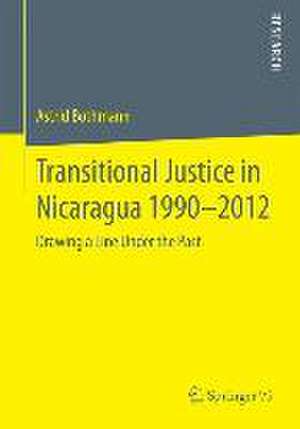Transitional Justice in Nicaragua 1990–2012: Drawing a Line Under the Past
Autor Astrid Bothmannen Limba Engleză Paperback – 21 iul 2015
Preț: 386.26 lei
Nou
Puncte Express: 579
Preț estimativ în valută:
73.98€ • 76.22$ • 61.97£
73.98€ • 76.22$ • 61.97£
Carte tipărită la comandă
Livrare economică 24 februarie-10 martie
Preluare comenzi: 021 569.72.76
Specificații
ISBN-13: 9783658105020
ISBN-10: 365810502X
Pagini: 334
Ilustrații: XIV, 320 p. 7 illus.
Dimensiuni: 148 x 210 x 24 mm
Greutate: 0.44 kg
Ediția:1st ed. 2015
Editura: Springer Fachmedien Wiesbaden
Colecția Springer VS
Locul publicării:Wiesbaden, Germany
ISBN-10: 365810502X
Pagini: 334
Ilustrații: XIV, 320 p. 7 illus.
Dimensiuni: 148 x 210 x 24 mm
Greutate: 0.44 kg
Ediția:1st ed. 2015
Editura: Springer Fachmedien Wiesbaden
Colecția Springer VS
Locul publicării:Wiesbaden, Germany
Public țintă
ResearchCuprins
The Sandinista era: Regime characteristics and human rights violations.- The Chamorro government: Elite interests and the balance of power.- The Alemán administration: The revival of caudillismo.- The Bolaños presidency: The attempted truth commission.- The Ortega II government: Recovering the revolution.
Notă biografică
Dr. Astrid Bothmann is a political scientist currently working as project manager in the department “Politics and Society” at the ZEIT-Stiftung Ebelin und Gerd Bucerius in Hamburg.
Textul de pe ultima copertă
Astrid Bothmann examines historical, political and socioeconomic factors that explain the absence of transitional justice in Nicaragua from 1990 to 2012. The author provides the first systematic analysis of the reasons for the lack of transitional justice in Nicaragua after the end of the Sandinista regime and the civil war (1990). Contrary to other Latin American states of the third wave of democratization, which put the perpetrators of past crimes on trial, established truth commissions, purged political and military officials, and made reparations to the victims, Nicaragua’s first post-war government opted for a policy of national reconciliation that was based on amnesty and oblivion. Subsequent governments followed this course so that the past has not been dealt with until today.
Contents
Dr. Astrid Bothmann is a political scientist currently working as project manager in the department “Politics and Society” at the ZEIT-Stiftung Ebelin und Gerd Bucerius in Hamburg.
Contents
- The Sandinista era: Regime characteristics and human rights violations
- The Chamorro government: Elite interests and the balance of power
- The Alemán administration: The revival of caudillismo
- The Bolaños presidency: The attempted truth commission
- The Ortega II government: Recovering the revolution
- Researchers and students of political science, sociology, law, history, and Latin American studies
- Politicians, human right activists, and NGO representatives
Dr. Astrid Bothmann is a political scientist currently working as project manager in the department “Politics and Society” at the ZEIT-Stiftung Ebelin und Gerd Bucerius in Hamburg.
Caracteristici
Study in political science Includes supplementary material: sn.pub/extras





